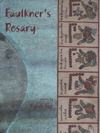Faulkner’s Rosary
At the heart of Sarah Vap’s Faulkner’s Rosary is a sense of conflict, at once extreme yet also subdued. With regard to the book’s overarching musings on maternity and the giving-of-life process, in all its various facets from the visceral to the religious, there is a collision of intense longing, optimism, anxiety, and even violence and aggression. Vap is a master of the unexpected juxtaposition, and she carefully fuses not only the maternal with the spiritual and natural, but also the possibilities of motherhood with a kind of child-like nostalgia and attention to detail. Her narrator recalls at one point her own ejection from the gifted program due to her religious curiosities, an anecdote which sits closely to the book’s core. On a technical level, Vap reveals her chops as well:
At the heart of Sarah Vap’s Faulkner’s Rosary is a sense of conflict, at once extreme yet also subdued. With regard to the book’s overarching musings on maternity and the giving-of-life process, in all its various facets from the visceral to the religious, there is a collision of intense longing, optimism, anxiety, and even violence and aggression. Vap is a master of the unexpected juxtaposition, and she carefully fuses not only the maternal with the spiritual and natural, but also the possibilities of motherhood with a kind of child-like nostalgia and attention to detail. Her narrator recalls at one point her own ejection from the gifted program due to her religious curiosities, an anecdote which sits closely to the book’s core. On a technical level, Vap reveals her chops as well:
Heat that would snarl the cathedral,
heat would wilderness
the steeple. Heat would break and rebuild
the whole hell, that held house.
Vap’s book succeeds in that it does not take the notion of motherhood to the realm of the overly sentimental (a poem that begins about the process of bearing a child will often finish with greater emphasis on a summer dress, or describe the child as the pit of a fruit)—nor the opposite—but rather sneaks in the scarce yet touching, tender moments amidst the complexities of reality: “I’d like us / to be the less delicate,” her narrator at one point pleads, among images of dragging and of smashing against rocks.





